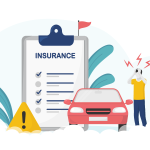Not So Fast & Furious: Why You Should Think Twice About Car Modifications
May 28, 2021

Custom car culture has increased in popularity over the years. After all, who doesn’t want their car to have that special “it” factor? Leather seats, big wheels, engine enhancements, exhaust systems, mufflers, and more, the list is endless. Whether you want it to run smoother, last longer, or look cooler, modifications can help you get the most out of your car and really make it your own—but they can also have some serious implications for your insurance.

While it’s important to maintain your car’s regular upkeep, any alterations that impact its appearance, performance, or functionality could spike your premium, or worse, void your coverage altogether. Before you get fast and furious, keep reading to learn more about how car mods can affect your auto rates, why, and what you can do about it.
What are car modifications?
Car modifications are any changes that make your vehicle look, sound, and/or drive differently from the manufacturer’s original specifications. Modifications enable drivers to customize cars to their needs and improve their performance, fuel economy, and handling.
Car mods typically fall into three categories:
Cosmetic Changes:
-
Custom paint jobs and banners;
-
Window tinting;
-
Spoilers and skirt sets;
-
Radio or stereo systems;
-
Under-body lighting;
-
Seat replacements;
-
Interior design;
-
Sunroof installation;
-
And more.
Accessibility Changes:
-
Wheelchair lifts and ramps;
-
Hand controls;
-
Steering wheel adjustments;
-
Pedal extensions;
-
Custom seat systems;
-
Safety belts;
-
And more.
Performance Enhancing Changes:
-
Non-standard alloy wheels;
-
Tire and rims;
-
Lifted or lowered suspension;
-
Larger transmission;
-
Special exhaust systems or mufflers;
-
Engine tuning (turbo or supercharger installation);
-
Alarms and security systems;
-
Bike or ski racks;
-
Air filter upgrades;
-
And more.
While your insurance company will allow certain modifications and might even cover them if they’re damaged, others could drastically affect your policy terms.
Why do car modifications affect insurance?
Auto Insurance pricing is based on a variety of factors related to the cost and frequency of claims. In addition to your age, driving habits and record, location, usage, and coverage needs, insurance carriers also look at available statistics and reports to estimate your car’s market value, how well it performs, and how likely it is to be involved in a claim. The higher the chance of a claim, the more you’ll pay. That means anything from the make, model, and year to the body type or engine size of your car could tip the scales when it comes to your premium.
Generally speaking, the most insurance-friendly vehicle is one that’s built by a factory and factory-tested for safety and accident prevention. Once you modify the car to any great extent, all that prior research on makes, models, and claims experience goes down the drain since you’re no longer comparing vehicles with the same features. And more importantly, with few exceptions, most changes will have a lasting effect on your car’s risk profile and value, both of which are key to calculating auto rates. Here’s why:
1. Risk Profile
Some alterations will directly affect how safe your vehicle is and place you in a high-risk category for insurance. Cosmetic mods like changing the paint colour, replacing interior components, and stereo upgrades might make your car more attractive to thieves and vandals, especially if you don’t have the security to match.
Alternatively, improper installation or poor quality parts could impair the vehicle’s performance instead of enhancing it. Remember, factory-built cars are built to specific requirements for safety reasons. The suspension, brakes, and transmission are designed to work together as an integrated system and any random tinkering under the hood could easily disrupt that system or cause electrical problems if parts haven’t been fitted correctly.
Even if the modifications are done well, any alterations that change how fast or powerful your car is could put you at higher risk of a collision or mean more damage if there’s a crash. For example, lifting your suspension could compromise stability and raise your centre of gravity. Engine mods and larger tires may make it harder to brake, while heavily tinted windows might hamper your visibility. Even something as simple as adding seat covers could interfere with safety if your car has side-impact airbags.
2. Value
Modifications usually go above the vehicle’s original price and boost its value, which increases what your provider would have to shell out for repairs and replacements in the event of a claim.
If the upgrades up your car’s value over a certain dollar amount—usually a few hundred dollars—your insurance company might not be able to cover the full damages for aftermarket parts. This is largely because replacing specialty parts and non-factory equipment is often difficult and expensive, particularly for rare or custom products.
Even if an insurer is willing to cover these mods, they’ll probably insist on an appraisal and heavily limit any potential insurance payout.
RELATED: Four Vehicle Features That Can Impact Your Auto Insurance Costs
How will it affect my insurance?
If you modify your vehicle, your insurance company may respond by:
-
Keeping Your Premium the Same: Changes that don’t have a significant impact on the safety or value of your vehicle will make little, if any, difference to your rates.
-
Raising Your Premium: This is the likeliest outcome for most car mods given the aforementioned reasons. Some changes will affect your premium more than others, but in general, if your car is faster, flashier, and more powerful, you’ll be paying more.
-
Denying Coverage: Depending on what you change, your current provider may not be able to insure you, in which case you’ll have to seek out a new insurance company.
-
Terminating Coverage: Some modifications are prohibited by your carrier; if you get them anyway, your claim could be denied and your coverage revoked. Additionally, making a car mod without your insurer’s knowledge or permission, even a temporary one or one that you know is permitted, will almost always result in denial or cancellation of coverage. Don’t believe us? Click here for a real life example.
What modifications are covered by insurance?
Although you’ll still have to pay extra, you shouldn’t have a problem securing coverage for mods made for appearance, accessibility, and safety reasons unless they considerably raise the chances of being in a collision or increase the value of your car.
In fact, you might even be rewarded for modifications that improve your car’s overall security. Steering wheel locks, ignition immobilizers, alarm systems, dash cams, anti-theft devices, and more might qualify you for a discount since they reduce the risk of a theft. Even a seasonal mod like winter tires could get you anywhere from 3-5% off your premium. But discounts vary by company so be sure to check with your provider before installing anything.
What modifications will void insurance?
Each province has strict auto laws that car owners must obey in order to drive legally. Auto laws dictate everything from how tinted your windows can be to the number of lights on your vehicle to minimum maintenance standards, and, you guessed it, car modifications.
To put it simply, if your mods aren’t legal, you can’t be insured. If you get them anyway, you’ll invalidate your existing coverage and you might even face fines and legal action for breaking the law.
Illegal modifications differ between provinces. Some of the most common ones include:
-
Off-Colour Lights: Your headlights, turn signals, and side marker lights can only be white and amber; it’s illegal to cover them or colour them otherwise. Your vehicle must also be a specific length if you want to add side marker lights.
-
Underbody Lights: Flashing neon lights, especially those fitted from under the body of your car, are distracting to other drivers on the road.
-
Tinted Windows that Restrict More than 70% of Light: Tinted windows that are too dark will impede your vision on the road. In some provinces, you can only tint your back windows; it’s against the law to colour your front windows and windshield.
-
And more.
Even if some mods are legal, they must meet certain requirements to be covered, like:
-
Engine Modifications: Check applicable provincial laws to see which components need to remain intact as part of your vehicle’s emission control system.
-
Lowering Vehicle Suspension: Make sure that your front wheels are visibly aligned, your vehicle isn’t touching the ground, and your tires aren’t coming into contact with your car.
-
Tires and Rims: As long as your tires and rims are approved for highway use (and don’t touch your car), you should be fine.
-
Seat Replacements: Much like your tires, any installed seats must be safe for highway use.
-
Spoilers and Fins: Spoilers must be secured and cannot obstruct your view of the road.
-
Paint Jobs: You must update your vehicle registration in order to change your car’s colour.
-
Steering Wheel: You can replace your steering wheel as long as your horn continues to function.
-
TV Screens: A TV or DVD player in the back is allowed, but not in front.
-
And more.
What should I do?
Follow the tips below to avoid getting into hot water with your insurer.
1. Decide if it’s worth it.
Despite how great they look and feel, some modifications might be more trouble than they’re worth in the long run. Lowering your suspension might make your body panels more vulnerable to scapes. Loud exhaust systems can violate noise laws. Modified engines need pricey fuel, performance brake pads wear down easily, specialized paintwork is hard to touch-up—and just the tip of the iceberg.
If you’re thinking about a permanent change, consider all of your options and see if there’s a smaller modification you can make to scratch the itch.
2. Do your research.
If you’re got your heart set on an upgrade, take the time to do your research. Find out if it’s legal where you live and drive, if it’s allowed by your insurance company, and if you’ll need a new permit. Spoiler alert: you will for any adjustments to your engine, fuel system, axels, doors, and body style.
3. Don’t cut corners.
Unless you’re a qualified mechanic, call in a professional to install and inspect your mods. When it comes to alterations, road safety should be the number one priority, not how sweet your ride is or how good it sounds. If you can’t afford to have modifications done by a professional, it’s not worth the risk of trying to do them yourself, no matter how good you think your skills are.
The best case scenario? A botched, but fixable, DIY job that takes extra time and money to correct. The worst case? You’ll be putting your life—and the lives of others—at risk.
4. Keep your insurance company informed.
If you’re thinking about altering your car, let your insurance provider know well in advance, even if the change in question seems minor. The rules for car modification vary by carrier and you don’t want to spend all that money and find out you won’t be protected when you need it most. Plus, you can see how the enhancements will affect your coverage and costs and decide if the premium spike is really worth it.
PRO Tips:
Be as transparent, truthful, and detailed as possible. Don’t try to minimize the extent of the alterations to try and save some money—there are plenty of other ways to save on Auto Insurance and lying to your provider is one of the biggest insurance mistakes you can make. Your insurer needs as much information as possible to make an appropriate risk calculation. If you leave something out, you’ll be underinsured when there’s a claim. Or you could be denied, your coverage cancelled for misrepresentation, and then you’ll be stuck in insurance hell trying to find a new carrier that’s willing to take you on.
RELATED: 12 Easy Ways to Save on Auto Insurance
5. Hold onto your receipts.
Be sure to hold onto your receipts once your modifications are complete; your insurance company will need them to re-appraise your vehicle and determine the appropriate level of coverage.
6. If you’re buying a modified vehicle, check with the seller.
Keep in mind: you have to declare all modifications that have been made to your car—whether you’ve made them yourself or not. This is critical if you’re specifically looking for a modified vehicle or if you suspect that a vehicle you’re interested in buying may have been modified. After all, you don’t want to be on the hook for any features you didn’t know about or ask for.
Be sure to:
-
Ask the seller or previous owner if they modified the car and if they updated their insurance provider.
-
Inspect the car for any big changes that look noticeably different from a standard factory model. Google the exact specs and year if need be.
-
Check the manufacturer’s website or even drop in to a dealership and ask for help.
-
If you’re uninterested in the mod or if you think it’ll have a huge impact on your rates, see if you can have it removed and the car restored to its stock form. This might be your only option if your insurer refuses to provide coverage or if the conversion isn’t legal.
7. Shop around.
If your existing carrier can’t secure you the right coverage, you might need to shop around for one that does. And even if they can cover you, it’s not a bad idea to get some other quotes; there’s always a chance you’ll find another company that can provide you with similar terms for a lower price.
However, for customized cars with extensive additions, you might need to look for a specialized insurance company that deals with modified vehicles.
So does this mean you can’t modify your car? Of course not. Your car is your pride and joy. And if you’re like most people, it might be the first big thing you’ve ever spent money on. If you want to make some changes to add a personal touch or turn it into your dream ride, you should! You just need to be careful about what you change, how you change it, and when you tell your insurance company. Plus, if you’re pouring all that extra money into your car, you’ll need to protect your investment with the right coverage.
That’s where we come in. Before you make any big decisions, give us a call. A licensed broker like PROLINK can help you figure out how your car mods will influence your policy and your premium. And if your current provider isn’t working out or if we see your rates going up over time, we’ll proactively shop the market on your behalf to make sure you’re always protected for the best value.
Connect with PROLINK today to learn more!
PROLINK’s blog posts are general in nature. They do not take into account your personal objectives or financial situation and are not a substitute for professional advice. The specific terms of your policy will always apply. We bear no responsibility for the accuracy, legality, or timeliness of any external content.




